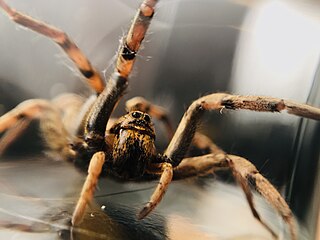
Wolf spiders are members of the family Lycosidae, so named for their robust and agile hunting skills and excellent eyesight. They live mostly in solitude, hunt alone, and usually do not spin webs. Some are opportunistic hunters, pouncing upon prey as they find it or chasing it over short distances; others wait for passing prey in or near the mouth of a burrow.

Huntsman spiders, members of the family Sparassidae, are known by this name because of their speed and mode of hunting. They are also called giant crab spiders because of their size and appearance. Larger species sometimes are referred to as wood spiders, because of their preference for woody places. In southern Africa the genus Palystes are known as rain spiders or lizard-eating spiders. Commonly, they are confused with baboon spiders from the Mygalomorphae infraorder, which are not closely related.
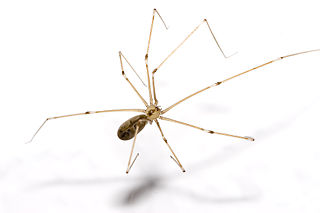
The Pholcidae are a family of araneomorph spiders. The family contains more than 1,800 individual species of pholcids, including those commonly known as cellar spider, daddy long-legs spider, carpenter spider, daddy long-legger, vibrating spider, gyrating spider, long daddy, and skull spider. The family, first described by Carl Ludwig Koch in 1850, is divided into 94 genera.

Crevice weaver spiders (Filistatidae) comprise cribellate spiders with features that have been regarded as "primitive" for araneomorph spiders. They are weavers of funnel or tube webs. The family contains 18 genera and more than 120 described species worldwide.
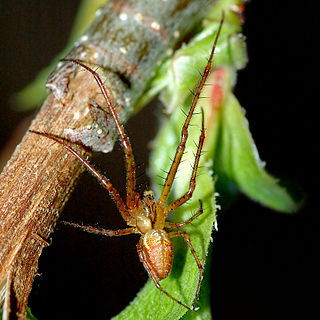
Long-jawed orb weavers or long jawed spiders (Tetragnathidae) are a family of araneomorph spiders first described by Anton Menge in 1866. They have elongated bodies, legs, and chelicerae, and build small orb webs with an open hub with few, wide-set radii and spirals with no signal line or retreat. Some species are often found in long vegetation near water.

Velvet spiders are a small group of spiders almost entirely limited to the Old World, with the exception of one species known from Brazil. In Europe, some are commonly called the ladybird spiders.

Metellina is a genus of tetragnathid spiders that occurs mostly in Eurasia, with two species found in North America. M. segmentata was introduced to Canada.

Metellina mengei is a spider of the family Tetragnathidae that is found in Europe up to Georgia. It was once considered a form of M. segmentata that occurs in spring. M. mengei is much rarer than M. segmentata.
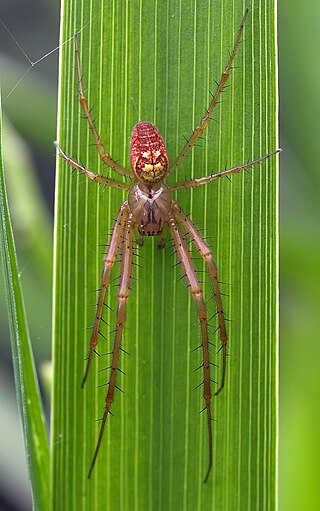
Metellina segmentata is a spider in the family Tetragnathidae with a Palaearctic distribution. This spider's name is often shortened to Meta segmentata, and some even call it Araneus segmentatus simply meaning, orb weaving spiders. It is primarily found in Europe, with the highest number in the United Kingdom, but the species has also been introduced to Canada.
In the 10th edition of Systema Naturae, Carl Linnaeus classified the arthropods, including insects, arachnids and crustaceans, among his class "Insecta". Wingless arthropods were brought together under the name Aptera.
Mollemeta is a monotypic genus of long-jawed orb-weavers endemic to Chile. It contains the single species, Mollemeta edwardsi, first described as Landana edwardsi, based on a female found in 1904. The name is a reference to "Molle", the Mapudungun word for "tree", because it builds its vertical orb webs on tree trunks. It is in a clade with Allende, Chrysometa, Dolichognatha, Meta, and Metellina due to several autapomorphies, including the unique shapes of the cymbium, conductor, and embolus.

Steatoda borealis is a species of cobweb spider in the family Theridiidae. It is found in the United States and Canada.
Meriola decepta is a species of true spider in the family Trachelidae. It is found in a range from the United States to Guatemala, Colombia, Ecuador, Peru, and Brazil.

Herpyllus propinquus, the western parson spider, is a species of ground spider in the family Gnaphosidae that occurs in North America.

Hibana gracilis, the garden ghost spider, is a species of ghost spider in the family Anyphaenidae. It is found in the United States and Canada.

Metellina mimetoides is a species of long-jawed orb weaver in the spider family Tetragnathidae. It is found in North America.
Pacificanthia is a genus of soldier beetles in the family Cantharidae. There are at least four described species in Pacificanthia.

Paracladura is a genus of winter crane flies in the family Trichoceridae. There are more than 30 described species in Paracladura.
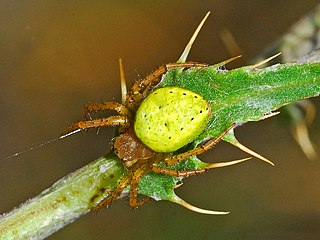
Araniella opisthographa is a species of orb weaver in the spider family Araneidae.

Wilhelmus Egbertus Antonius Janssen, better known as Father Chrysanthus OFMCap, was a Dutch priest and biology teacher. He was known for his studies in arachnology. Initially he was concerned with the spiders of the Netherlands but he became a specialist on New Guinea spiders. Two spider species were named in his honor following his death.














